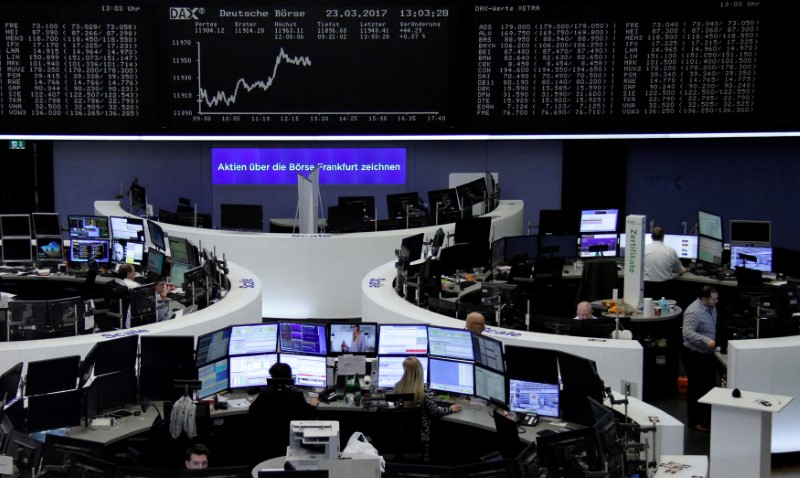By Abhinav Ramnarayan
LONDON (Reuters) - The euro dipped and bond yields hit multi-week lows on Thursday as easing inflation in Spain and Germany led investors to row back further on expectations of when the European Central Bank might tighten monetary policy.
The single currency
Signs of economic strength and strong inflation data - and an acknowledgement of these factors by policymakers - fueled talk that the ECB might soon switch out of stimulus mode and follow the U.S. Federal Reserve, which has embarked on a rate hike cycle.
But annual consumer inflation in Spain eased to 2.1 percent in March, missing Reuters poll forecasts of 2.7 percent, and German inflation was weaker than expected at 1.5 percent.
"The Spanish numbers (are) pretty weak ... and German regional numbers have also seen a fair bit of slowing ... I suspect that's another reason you have a weakening euro," said Investec economist Ryan Djajasaputra.
On Wednesday, six sources in and close to the ECB governing council told Reuters euro zone policymakers were keen to reassure investors that their easy money policy was far from ending.
Prior to that report, money markets were pricing in the possibility of an ECB rate hike in December and fully pricing one in for next March. Both were seen as less likely on Thursday.
The euro may have also come under pressure after British Prime Minister Theresa May formally began Britain's exit from the European Union on Wednesday, launching a two-year negotiation process before the divorce comes into effect.
Oil prices, up on disruptions in Libya, helped push European blue chip stocks a touch higher (FTEU3). The broader Euro STOXX 600 (STOXX) rose 0.11 percent.
U.S. stock futures were pointing toward a subdued open (ESc1) ahead of speeches by Fed policymakers.
South Africa's rand recouped some losses on Thursday from a three-day dive as the future of the country's finance minister remained uncertain.
STEADY DOLLAR
Reassurance overnight from U.S. policymakers went some way towards bolstering faith in the economic and policy direction of the world's richest country, giving support to the dollar.
There was further positive news with final U.S. economic output data showing that economic growth slowed less than previously reported in the fourth quarter amid robust consumer spending that was partially met with a rise in imports.
The greenback rose 0.2 percent against a basket of six major currencies and was up 0.3 percent against the yen, coming firmly off four-month lows hit against the Japanese currency earlier this week. (DXY)
It fell last week after the failure of President Donald Trump's U.S. healthcare reform bill brought the "Trumpflation" trade into doubt.
Chicago Federal Reserve President Charles Evans, a voter on the policy-setting Federal Open Market Committee, said on Wednesday he supported further interest rate hikes this year given progress on the Fed's goals of full employment and stable inflation.

Federal Reserve members Loretta Mester, Robert Kaplan and John Williams are due to speak on Thursday.